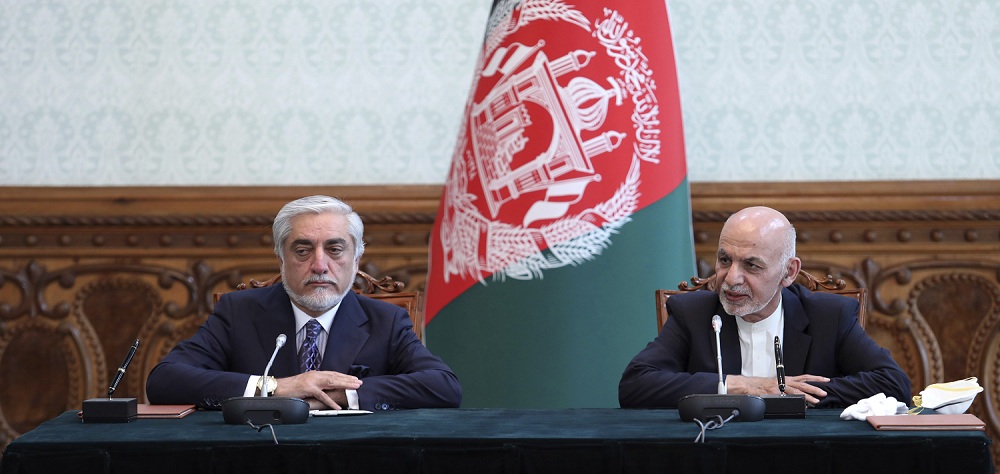Alwaght- Afghanistan’s months-long political crisis reached a settlement on Sunday as two election rivals Ashraf Ghani and Abdullah Abdullah signed a power-sharing deal in Kabul.
The two political rivals have been engaged in a power struggle since September last year following the presidential election. When in mid-February Independent Election Commission declared Ghani the winner of the September 28 election, Abdullah rejected the result, arguing that the election was marred by fraud. The dispute over who is the real president resulted in the bizarre reality of two men taking the oath of office as president on the same day, same hour, and the same city. Ghani held his event at the Presidential Palace and Abdullah at Sepidar Palace which is also is a diplomatic site.
Relying on home capabilities and rejecting foreign meddling
The negotiations of the prominent politicians like former President Hamed Karzai, former mujahideen leader Abdul Rasoul Sayyaf, and former Vice-president Yunus Qanuni finally came to fruition, seeing Ghani and Abdullah signing an agreement to share the power and end the dispute with the formation of a new cabinet. The agreement demonstrated that the government in Afghanistan this time will not be formed by foreign meddling but as a fruit of home consensus of a majority of the political groups to pass the crisis and political instability.
The recent Kabul agreement is significant both because it determined the fate of the government and installed Ghani as president and Abdullah as the head of a pro-peace body dubbed Home Peace Initiatives Council and because it was an outcome of joint efforts of the Afghan politicians and elites. To put it differently, the Afghan politicians showed the world that they can settle their home problems and crises without foreign interference. This is of paramount importance to the new Afghan government.
On the other side, the threats by the American officials, including Secretary of State Mike Pompeo who in early May threatened that if the Afghan sides fail to reach a power-sharing deal to end the political deadlock, the US will cut off its financial support to the Afghan government, should not be ignored, though at the time Ghani rejected the threats and said that the US aid reduction will not affect the Afghan people’s life and the country’s economy and development.
Kabul government now free for peace talks with the Taliban
Certainly, one of the main outcomes of the agreement over the new government is the determination of negotiators with the Taliban. Until the agreement was reached, the future of the peace dialogue with the Taliban has been overshadowed by an unclear fate of the government in Kabul. Before the agreement, the legitimacy of Ghani’s government was under the question from Abdullah camp and also the Taliban. Without the deal, the presidential palace had no legitimacy to pursue the peace process with the insurgent group.
Now that a deal on sharing the power is signed between the two candidates and the head of the government is made clear, the administration of Ghani can follow the talks with the Taliban leaders on the strength of public legitimacy.
The outlook of Afghanistan developments
One of the top expectations of the Afghan people from the new government is the conclusion of the peace talks with the Taliban.
This expectation is now even more optimistic as Abdullah is given the leading role in the country’s peace process.
In the new page of Afghanistan politics and according to the agreement, the peace negotiations will be followed by Abdullah. The result will very likely bear the hope of lasting peace for Afghanistan as Abdullah himself is from the Hazara ethnic group and the Taliban are Pashtuns. This, actually, will remove the pessimism surrounding the negotiations being ethno-sectarian.
Abdullah has so far proven that he has the potentials to advance talks and agreements. This is clear from his agreements with his political rivals and also his capability to bring to political participation the ethnic and political groups. Therefore, Afghanistan will head to the talks with even greater optimism under him.
In the current conditions in which the security situation is unstable, an economic crisis hits amid coronavirus outbreak in the country, and poverty is growing, the formation of a new government presents a more optimistic outlook to combat these crises.



























